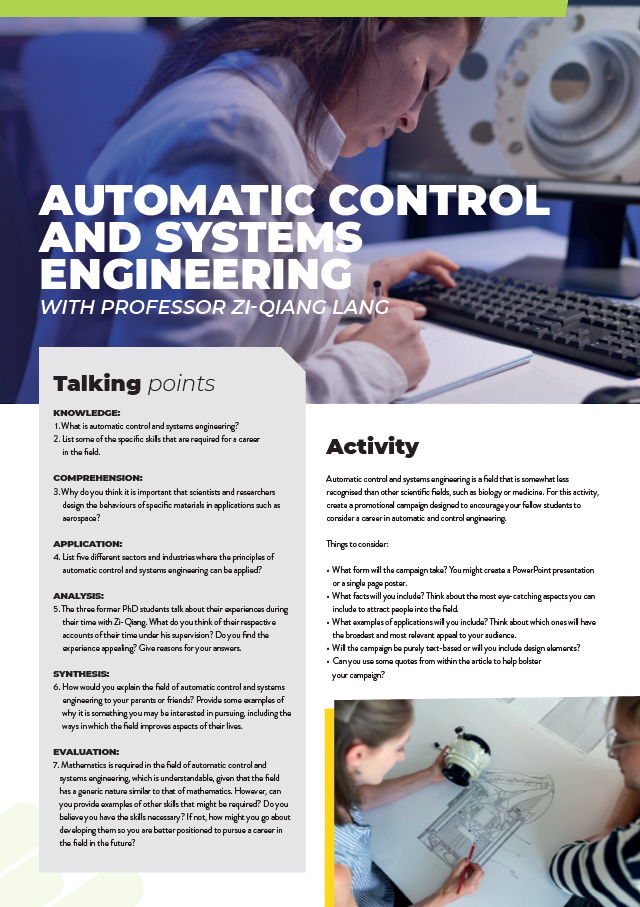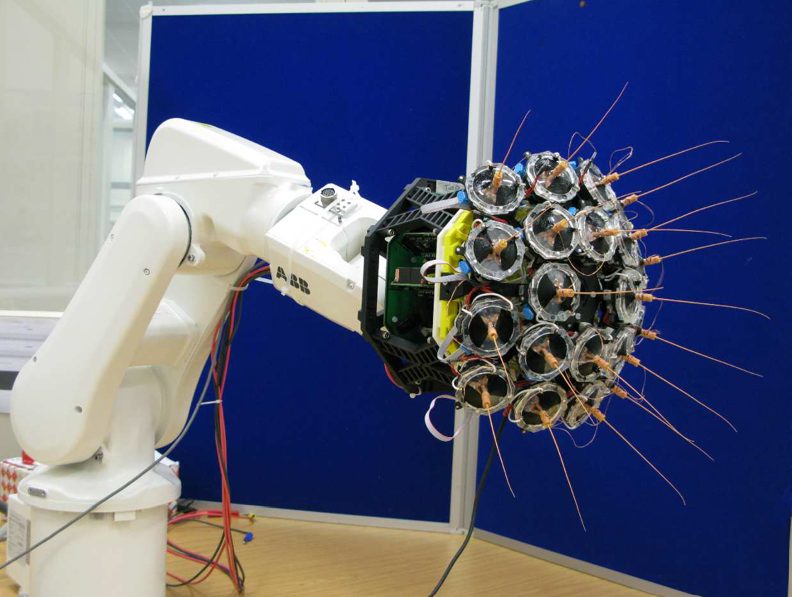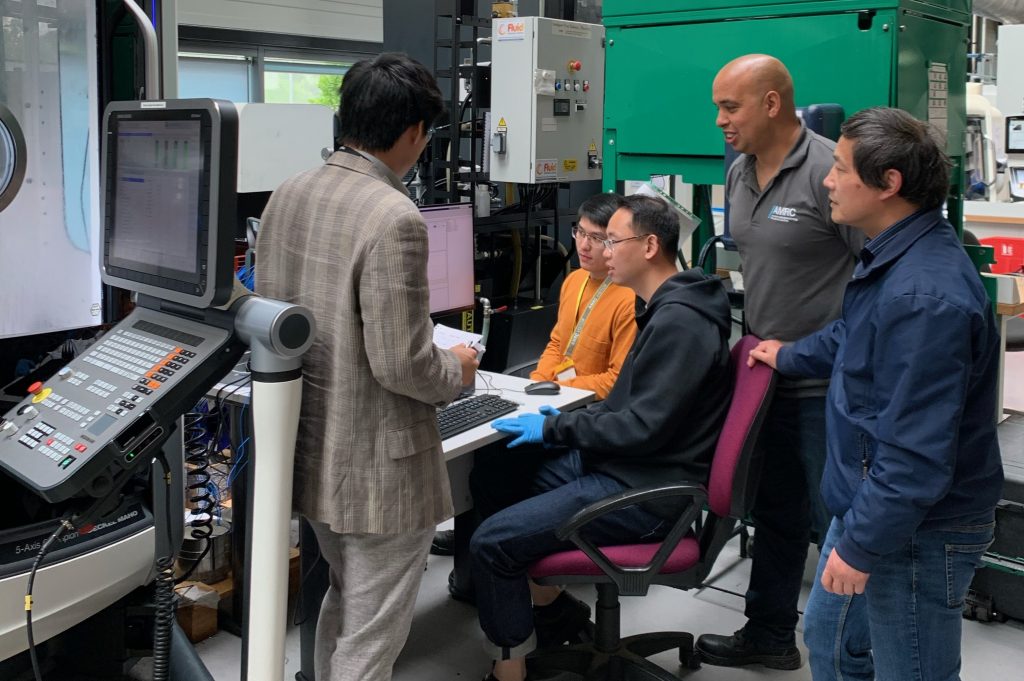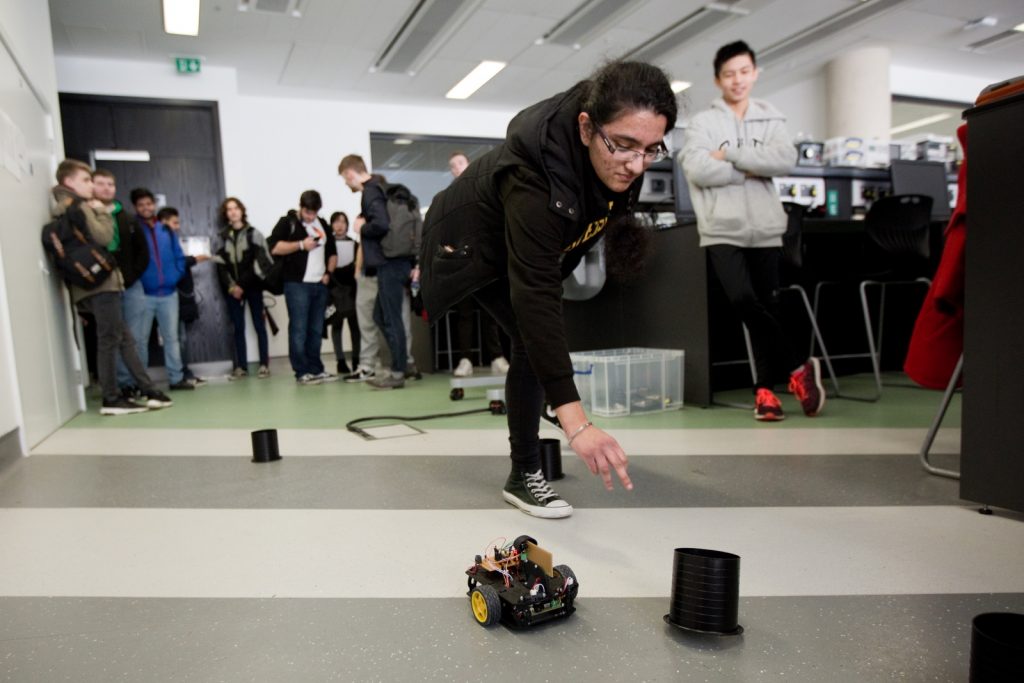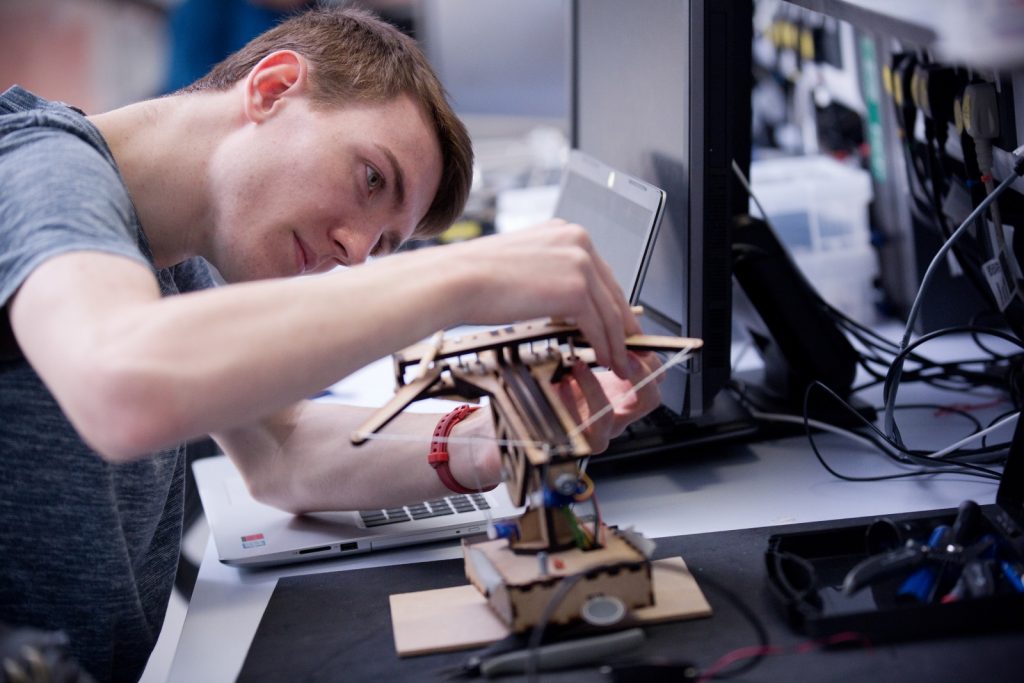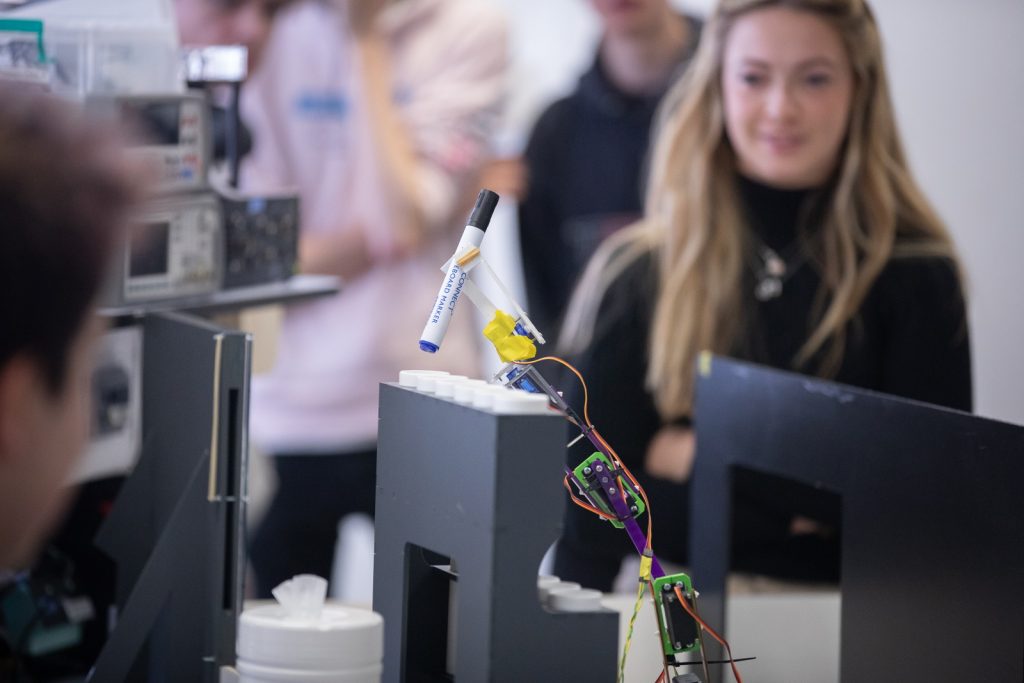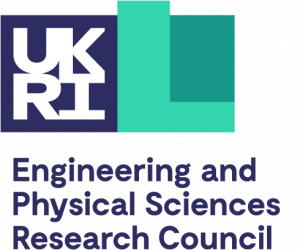Controlling and engineering systems for the benefit of all
Professor Zi-Qiang Lang is an automatic control and systems engineer based at the University of Sheffield in the UK. Three of his former PhD students, a former PhD supervisor and Zi-Qiang share what it means to be an automatic control and systems engineer. Together, their commentaries highlight what is required to succeed in the field.
TALK LIKE AN AUTOMATIC CONTROL AND SYSTEMS ENGINEER (WORKING ON COMPLEX ENGINEERING SYSTEMS)
Artificial Intelligence — makes it possible for computers and machines to perform human-like tasks while learning from their experiences
Big data — a collection of information in massive volumes too complex and large to be processed by traditional methods
Composite material — a substance that is made up of different components with different chemical and physical properties
Data-driven modelling — using previously collected data and information to create an understanding of how an engineering system would operate
Engineering system — a combination of elements and components that work together to perform a useful function
Machine learning — a type of artificial intelligence that allows computers to predict outcomes more accurately by learning from historical data and information
Prototype — a model or sample of a product that is created to test its functionality
Prototype fabrication — the process of creating a prototype
Automatic control and systems engineering might be a subject you have not heard too much about, but it is one that permeates many aspects of your life and the lives of those around you. For instance, if you have ever taken a flight, train or car ride, this has been made possible by automatic control and systems engineers such as Professor Zi-Qiang Lang.
Zi-Qiang is a systems engineer based at the University of Sheffield in the UK and has worked on multiple projects. One of these projects involves the application of systems and control approaches to the optimal design of complex engineering structures such as designing aircraft landing gears made of composite materials.
Why is systems engineering important?
In the area of complex engineering system designs, a systems and control engineering approach enables manufacturers to build a physically meaningful model of a system. “A key challenge is how to integrate domain knowledge into a generic data-driven model that can accurately represent the underlying physics associated with a given design problem,” explains Zi-Qiang. “Achieving this implies that the well-established field of system science can be applied to address many challenges that cannot be solved by conventional engineering system design approaches.”
Questions and research methods
The fundamental question Zi-Qiang and his team have been trying to answer is how to build a physically meaningful model of an engineering system that can be designed from data collected from a limited number of prototype tests. In addition, Zi-Qiang wants to understand how to perform an optimal design of systems based on physically interpretable data-driven models.
“A modelling and design integrated approach uniquely proposed by my team at the University of Sheffield has been used to develop new engineering system design processes,” says Zi-Qiang. “This produces a powerful computer-aided design tool that uses data from only a limited number of prototype tests to produce an optimal design for complicated engineering systems including, for example, mechanical and civil engineering structures and complex dynamics materials.”
Importantly, the applications for the intended outcomes of this project extend to fields as diverse as aerospace, healthcare, infrastructure and transport.
Key findings and successes
The key findings so far include determining the methodologies that can be used to build physically meaningful, design-oriented data-driven models, as well as the development of a range of successful feasibility studies, which is an assessment of the practicality of a project or system. Together, these demonstrate the significance and potential applications of this unique modelling and design integration approach in various industrial sectors.
“One feasibility study on the study of auxetics (which are structures or materials that, when stretched, become thicker perpendicular to the applied force), showed that the new design approach can achieve a 70% reduction in the fabrication of prototypes, compared with traditional designs,” explains Zi-Qiang. “This has many applications including in body armour, packing material, knee and elbow pads, robust shock-absorbing material and even sponge mops!”
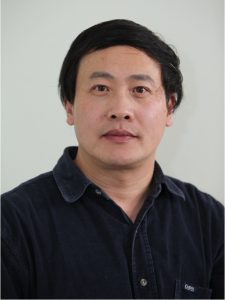 PROFESSOR ZI-QIANG LANG
PROFESSOR ZI-QIANG LANG
Professor of Complex Systems Analysis and Design, Department of Automatic Control and Systems Engineering, University of Sheffield, UK
Field of research: Automatic Control and Systems Engineering
Research projects: Zi-Qiang is engaged in various projects to develop better engineering system design processes, create novel engineering system operational condition monitoring methods, and apply newly devised system and control approaches to multidisciplinary areas from advanced manufacturing to medical diagnosis. The results of his studies have demonstrated significant improvements in these important application areas and the potential of the use of systems and control engineering methods across a very wide range of fields.
Funder: UK Engineering and Physical Sciences Research Council (EPSRC). This work was supported by the EPSRC under award number EP/R032793/1.
ABOUT AUTOMATIC CONTROL AND SYSTEMS ENGINEERING
Automatic control and systems engineering is a subject area that applies engineering mathematics and computing technology to solve scientific and engineering problems. For instance, aircraft engine control, wind turbine operational condition monitoring and robot control are all sectors that rely on automatic control and systems engineering expertise. The applications of the field are involved in almost every area of society.
Why consider a career in automatic control and systems engineering?
Reference
https://doi.org/10.33424/FUTURUM319
Automatic control and systems engineering is a highly rewarding field that can contribute significantly to society. It relies on the design, manufacturing and operation of almost all engineering systems and, as a result, engineers with expertise in the field are needed in almost every industrial sector.
What does Zi-Qiang find most rewarding about his career in the field?
Zi-Qiang tells us that he most enjoys the multidisciplinary nature of his career and the opportunities it provides for close collaboration with colleagues. “The nature of the field provides excellent job opportunities across a broad range of disciplines,” explains Zi-Qiang. “I get to work with people from a variety of science and engineering backgrounds and resolve challenging problems in various subject areas that have significant importance to society.”
What challenges will the next generation of automatic control and systems engineers encounter?
One of the most significant challenges the next generation will face is how best to integrate artificial intelligence (AI) and machine learning (ML) into system and control engineering. If we can find a way to achieve this, it will allow sufficient exploration of the advantages of AI and ML in big data processing and human intelligence–based decision making, enabling intelligent design, manufacturing, management, operation and control of various engineering systems.
Pathway from school to automatic control and systems engineering
• Zi-Qiang suggests students take as many maths courses as possible, as well as one or two other science subjects, such as physics, chemistry or biology.
• Two or three A-levels, or equivalent, in a relevant subject for a degree.
• When pursuing a systems engineering degree, you’ll likely first obtain a bachelor’s degree in systems engineering and then focus specifically on your desired industry when pursuing a master’s degree.
Explore careers in automatic control and systems engineering
• The International Council on Systems Engineering (INCOSE) is an essential resource for anybody interested in pursuing a career in the field.
• MITRE is another resource that features an extensive knowledge-sharing culture, including people from academia, industry and other non-profits.
• According to Glassdoor, the average salary for a systems engineer in the UK is £41,400, depending on the level of experience.
How did Professor Zi-Qiang Lang become an automatic control and systems engineer?
I grew up on a university campus and became interested in systems and control engineering subjects when I was very young. My father was a university professor in Automatic Control. Many of his friends and colleagues were well-known scientists in this area. My academic interests have been significantly influenced by this background – it is the research achievements and experiences of my father and his friends and colleagues that inspired me to become an automatic control and systems engineering scientist.
One of my proudest achievements is that an innovative concept I proposed in 2005 in the subject area of system science known as Nonlinear Output Frequency Response Functions (NOFRFs) has been widely recognised in relevant communities. The concept and associated approaches have now been applied by many researchers to solve challenging problems in different disciplinary areas including robotics, renewable energy, and advanced manufacturing.
I regularly engage in sports like running and squash. I also like to study history, from which I realise many principles of systems and control engineering can also be applied to explain phenomena in human history. For example, according to the system and control theory, the stability of a system is completely determined by the inherent natures of the system itself rather than external inteference. From the history of human beings, we know that this principle also works in social systems.
Zi-Qiang’s Top Tip
It is essential that you develop a systematic view of the things around you as soon as possible. This is critical for conducting multidisciplinary studies where integration of a system and control approach with different domain knowledge is the key to achieving a solution.
Meet former PhD students
We spoke with three of Zi-Qiang’s former PhD students – Dr Uchenna H. Diala, Dr Sikai Zhang and Dr Rafael S. Bayma – to learn about their experiences as automatic control and systems engineering PhD students.
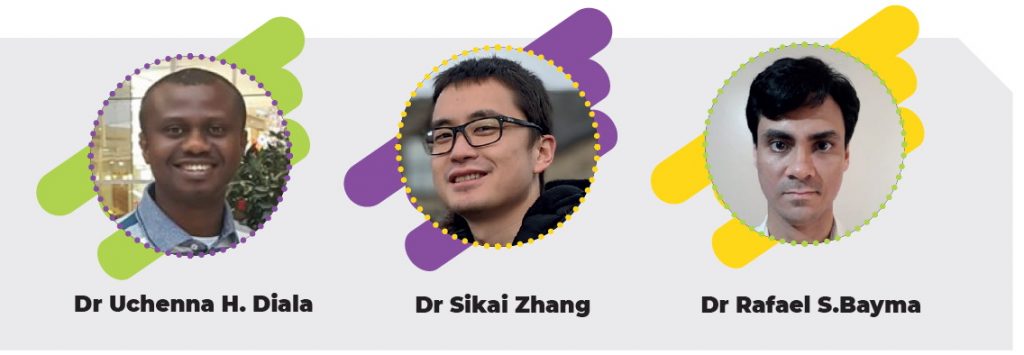
What does a typical day in the life of an automatic control and systems engineering PhD student involve?
Dr Sikai Zhang (SZ): After making a cup of coffee or tea, I start my research work, which includes reading literature, coding and writing. Around noon I would have lunch and chat with other PhD students in our department.
Dr Uchenna H. Diala (UD): It involves carrying out research related to the modelling and analysing of control systems, as well as the design of controllers for the engineering system of interest.
What are the main challenges in systems and control engineering research and how do you manage them?
Dr Rafael S. Bayma (RB): It depends on what specific area we are investigating. In the topic that I undertook, the main challenge was the development of a consistent and systematic approach to understanding and describing very complicated dynamic systems.
UD: The main challenge is formulating a model that closely represents an actual system. This is usually managed by making certain assumptions to enable a good representation of the system of interest.
SZ: The research in control and systems engineering generally requires a solid foundation in mathematics. The first year of a PhD is a good time to deeply understand the basic maths knowledge, such as Fourier transform, Laplace transform, autoregression model, etc.
Who or what inspired you to become an automatic control and systems engineer?
SZ: My interest in control systems started in 2012 when I participated in a smart car rally organised by a Japanese company called Renesas.
RB: I always liked subjects related to maths and computers. I studied fractals in my first year in college. I was also fascinated by the fact that all of those theories had real applications. When I was about to finish my undergraduate course, I went to a conference and learned about system identification. At that time, I met a professor who undertook his PhD at the University of Sheffield in the subject area, and I think that attracted me a little more to it.
UD: The versatility of automatic control systems was the major inspiration because the course enables you to fit into any professional field, whether science, engineering or finance. I enjoy the possibility of engaging in multidisciplinary research because of the overlap control systems engineering provides across most other professional fields.
What are your plans for the future?
UD: I have graduated and currently work at a university as a lecturer in electrical and electronic engineering. I hope to become an outstanding professor in the future, developing technologies that will make the world a better place.
SZ: I am working as a senior research engineer at Rockwell Automation. My ambition is to make the industry more energy-saving and summarise my work into a book.
RB: In the past, my priority was to get back to my workplace because my graduation was bound to it by contract. The plan was to set up a research group and activities in this area. However, this did not prove easy owing to local conditions. At present, I am more inclined to consult or perhaps start a business in either technology or education in areas related to the knowledge I have been able to gather so far.
Meet Professor Stephen A. Billings
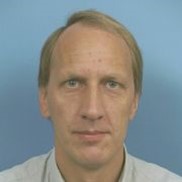
Emeritus Professor, Department of Automatic Control and Systems Engineering, University of Sheffield
We had a conversation with Professor Stephen A. Billings, who supervised Zi-Qiang during the latter’s time as a PhD student, to get a sense of what it is like for an experienced professor working in the field of automatic controls and systems engineering.
Professor Zi-Qiang became my student initially. He then became my research assistant before becoming a professor himself. It was great to see his development and know that I assisted in some way. I have successfully supervised 55 PhD students, each one being as special as it was when I first began supervising.
Dynamic systems are almost everywhere and span the entire range of engineering and scientific disciplines. The developers and users of these systems need to understand their behaviours and learn how to study and control these systems.
Management of the team who work for you is very important and a lot of time is spent planning and thinking about these issues. Does everyone know what they are supposed to be doing, does anyone need help, do they know and understand the plan for the future etc.? This may involve meeting individuals, meeting as a small group or planning and thinking through projects.
The main challenges are to be good at maths, computing and experimentation. This is a challenge but equally provides very interesting opportunities. Control and systems engineers also need to be open to new developments that arise and to utilise and advance these.
A career in automatic control and systems engineering provides systems engineering skills that can be applied to a wide range of challenges, from industrial processes, space weather, and machine vision to biology, medicine etc. This is much wider than people first appreciate and can lead to the development of multiple skills over a range of interesting problems.
Do you have a question for Zi-Qiang, Uchenna, Sikai, Rafael or Stephen?
Write it in the comments box below and Zi-Qiang, Uchenna, Sikai, Rafael or Stephen will get back to you. (Remember, researchers are very busy people, so you may have to wait a few days.)


